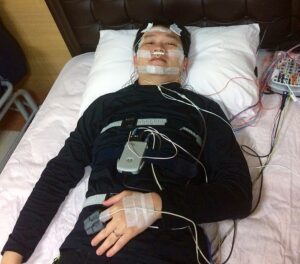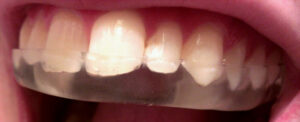April 9,2020: My husband woke up to a vigorous crunching noise in the middle of the night only to discover that I was clenching and grinding my teeth. The following morning, I looked at myself in the mirror and caught very fine involuntary twitches in my left eye and upper lip. Having specialized in the dental field, I panicked at the thought of suffering from initial signs of bell’s palsy (transient facial paralysis)! This hypochondriac feeling only intensified my bruxism (grinding of teeth) in the coming days.
However, with time I realized that due to uncertainty and isolation during COVID-19 pandemic, I was immensely stressed, especially because I had just finished defending my PhD dissertation proposal and started working on my thesis project. The anxiety of ‘when will I be able to return to my experiments’ manifested as grinding of teeth in my sleep. My self-diagnosis was justified a year later, when I read the statistics of rising bruxism cases in dental clinics during the pandemic, published by the American Dental Association.
Bruxism is repeated movements of the muscles involved in chewing characterized by forceful biting (clenching) and grinding of teeth. Bruxism occurring in sleep is called sleep bruxism. Awake bruxism mostly involves clenching alone and is also associated strongly with anxiety and stress. Bruxism can be manifested without any underlying conditions or can be secondary to certain psychiatric or medical conditions.
Although the prevalence of sleep bruxism is recorded to be higher in children than in adults, I believe that adult sleep bruxism is under-reported. The main reason being, generally, unless coupled with sleep apnea (interrupted breathing during sleep), the bruxist (person with bruxism) will not be aroused from sleep. Therefore, unless one’s sleeping partner reports tooth grinding sounds, the bruxist would be unaware of his/her condition.
Depending on the frequency and intensity of bruxism, the bruxist may present with tooth surface loss, enlargement of muscles involved in chewing, non-specific painful teeth, jaw joint pain, headache, chipping/fracture of dental fillings and teeth.

The cause/etiology of bruxism is complex and multifactorial. Historically, it was believed to be caused by bite disturbances. This led to management of the condition by adjusting/grinding the teeth irreversibly. We now know through controlled studies that the condition is due to the motor activity of the muscles involved in chewing and has very little to do with bite problems. Although the absolute cause of bruxism is still unclear, several risk factors like smoking, heavy alcohol consumption, caffeine, certain medications (e.g., certain anticonvulsants, phenethylamines etc.), drugs (like heroin), sleep apnea and gastrointestinal reflux disorder (regurgitation of stomach acids to esophagus) have been strongly associated with the condition. One study has also found genetic predisposition to development of bruxism.
Owing to the complex etiology of bruxism, the diagnostic criteria become equally tortuous. Multiple assessments need to be performed to establish the diagnosis. According to 2013 international consensus, self-reporting will lead to a ‘probable’ diagnosis, self-reporting combined with positive clinical findings lead to ‘possible’ diagnosis and when both are coupled with from polysomnograph (multi-parametric sleep study) and electromyography (measures electrical response on muscle activity) tests, the diagnosis can be ‘definitive’.

In primary bruxism associated with anxiety and stress, relaxation techniques will help alleviate the symptoms. For instance, as soon as I discovered that I was stressed during the pandemic, I resorted to yoga (group of physical, mental, and spiritual practices) and pranayama (controlled breathing) techniques to calm myself and channel my anxiety towards productivity. Although scientific evidence is scarce regarding stress relief in bruxism, one’s traditional cultural practices are immensely helpful in relieving the symptoms. This helped me bypass using mechanical mouth (bite) guard to prevent the adverse effects of bruxism on teeth and jaw muscles.
Furthermore, some medications like antihypertensives and antidepressant drugs have proven to reduce bruxism. In the case of secondary bruxism, the underlying cause needs to be established (sleep apnea or medication inducing bruxism) and appropriately remedied.
It has been 21 months; my husband has not complained about my teeth grinding! However, now my sleep is disturbed by his all-new snoring ☹
Peer edited by McKenzie Murvin